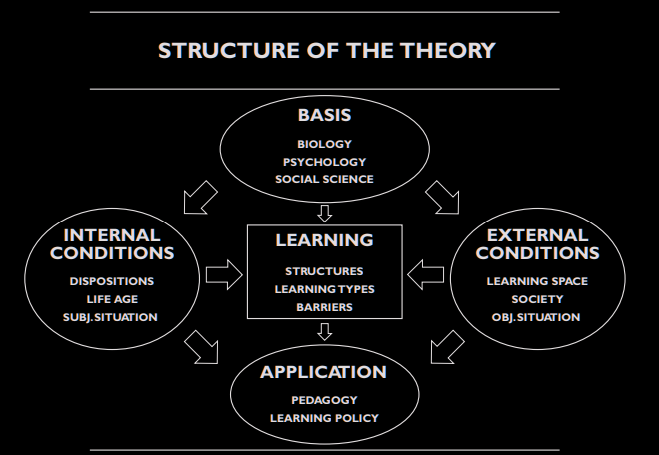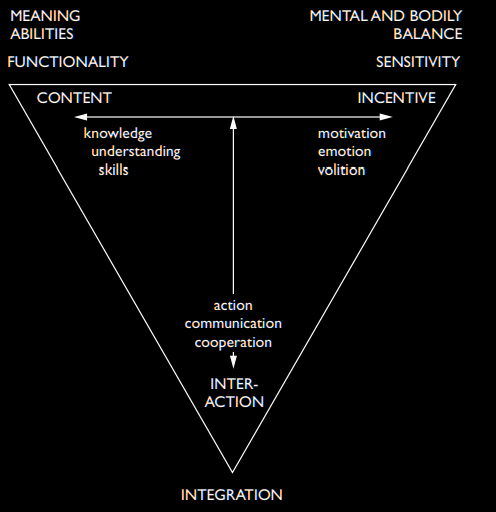Status: #📥/🟨 Tags: EDUC 100W Readings - Learning Links: & Papers
& A comprehensive understanding of human learning
Notes
Definitions
Learning can broadly be defined as any process that in living organisms leads to permanent capacity change and which is not solely due to biological maturation or ageing 1
- the concept of learning includes a very extensive and complicated set of processes, and a comprehensive understanding is not only a matter of the nature of the learning process itself. It must also include all the conditions tha tinfluence and are influenced by this process.
Title
- What specifically do they mean by human learning?
- In what ways would human learning be different from what we just discussed about animal learning?
- What would successfully constitute a comprehensive understanding? How can one achieve that within a single paper?
Abstract (p. 1)
- What (topic discussed)
- The different concepts of human learning theories and understandings
- But/why (Contradition/incompatibility)
- They have had different angles, different epistemological platforms and a very different content.
- How (Proposed solution)
- The basic idea of the approach to learning presented in this chapter is to build on a wide selection of the best of these constructions, add new insights and perspectives and in this way develop an overall understanding or framework, which can offer a general and up-to-date overview of the field
Conclusion
- The author wants us to take this understanding of learning to help tackle some problems within learning, making sure all aspects are well attended to
Ideas
Vertical = knowledge Horizontal =
Structure of Learning
-

- Basis is learning theory, basis of knowledge and understanding
- Pulled from foundations of biolody, psychology, social science
- Conditions of learning
- Literal specifics like brain mechanisms and stuffs
- Learning is embodied, requires our interactions
- Middle is types of learning
- Sides are what influence our learning
- Bottom is output
2 Processes
The first important condition to realise is that all learning implies the integration of two very different processes, namely an external interaction process between the learner and his or her social, cultural or material environment, and an internal psychological process of elaboration and acquisition –page 8
- Implies that it depends on the potential/initial learning we can gain from our environment, then our actual efforts in putting into fruition and learning?
3 Dimensions
Requires mental schemes, the building of learned information into structures
- Psychological acquisition
- External interaction process is double arrow between environment and individual
- Psychological functions (content, incentive) is also double arrow
- Forms three angles, which are dimensions of learning
it is the core claim of the understanding that all learning will always involve these three dimensions.
-
 Content
Content - Content is based on learnings
- Knowledge, skills
- Opinions, values, behavior, methods
- Used for functionality, to incorporate meaning and ability into life
Incentive
-
Provides and directs mental energy for learning to occur
- Feelings, emotions, motivation, volition
-
Ensures mental balance of learner, creating a personal sensitivity
-
Content and incentive influence each other
- Incentive is based on the way we interact with what we learn (elaboration, acquisition)
- Content is based on what we want to learn
Example
- When teacher teaches chemical processes:
- Vertical double arrow
- Teacher gives information to students
- Problematic if teacher fails to explain properly
- Students ask questions from teacher
- Problematic if lack of concentration
- Based on incentive to learn
- Problematic if lack of concentration
- Teacher gives information to students
- Horizontal double arrow
- Emotionally connect to learnings
- Understand the actual concepts
- Vertical double arrow
- Problems can harm the relationship between interaction, resulting in distaste of the teacher/subject
Interaction
Four Types of Learning
- Schemes help us categorize things into topics/themes in the content dimension
In relation to learning, the crucial thing is that new impulses can be included in the mental organisation in various ways, and on this basis it is possible to distinguish between four different types of learning which are activated in different contexts, imply different kinds of learning results and require more or less energy –page 13
-
We have different ways of learning that we switch between?
-
Transformative is early, assimilation and accomodation are common, transformative is rare yet profound
Cumulative/Mechanical Learning
- Isolated, not connected to anything else
- Occurs during early years, or when learning random information (PIN code)
- Only recalled, applied in related contexts
- Conditioning
Assimilative/Additional Learning
- Linking a new idea to a scheme already established
- ex) Calculus adds onto algebra
- Only linked to a specific school subject, not translated into other areas
- How can we allow for learning outside the desired context?
- Brick by brick
- Developmental sensory learning
- Bricks are like reaaching out, eye contact
Accomodative/Transcendent Learning
- happens when connection-making is difficult, but it seems important
- Break down already-established schemes to allow for integration of new
- Such deconstruction/synthesizing requires a lot of mental energy, as it requires open-mindedness
- Decomposition allows the concepts to be recalled/applied in various context
- Break down already-established schemes to allow for integration of new
- True internalization
- Challenging barriers
- Environmental effects on learning
- Competitiveness of kahoot can positively or negatively cultivate learning
Transitional/Transformative Learning
-
This learning implies what could be termed personality changes, or changes in the organisation of the self, and is characterised by simultaneous restructuring of a whole cluster of schemes and patterns in all of the three learning dimensions – a break of orientation that typically occurs as the result of a crisis-like situation caused by challenges experienced as urgent and unavoidable, making it necessary to change oneself in order to get any further. Transformative learning is thus both profound and extensive, it demands a lot of mental energy and when accomplished it can often be experienced physically, typically as a feeling of relief or relaxation. –14
Barriers to Learning
- Mislearning
- Caused by inattentiveness, lack of foundational knowledge
- Everyday consciousness
- Mental resistance
- Formed during learning
- Potentially beneficial
- Revolutionary breakthroughs happened when people didn’t want to accept given truths/understandings
- Creates indepenence, responsibility, flexibility, creativity
Defense mechanisms
- Filtering out or distorting disagreeable learnings
- Results in no learning
- Exists prior to learning event
- Sometimes they lack and can result in letting negative influences overwhelm us
- ex) Constantly exposed to news which can cause depression
- ex) Identity defence
- When we are challenged with a major obstacle in life?
-
In the most important cases, for instance when a change to a basically new situation in a certain life area must be overcome, most people react by mobilising a genuine identity defence which demands very hard work of a 16 Knud Illeris more-or-less therapeutic character to break through, usually by a transformative learning process. This happens typically in relation to a sudden situation of unemployment or other fundamental changes in the work situation, divorce, death of closely related persons or the like, and it is worth realising that such situations happen much more frequently in the modern globalised market society of today than just a generation ago –16
- ==Don’t fully understand==
- ex) Ambivalence
- A mix of both wanting and not wanting to learn
- Unexpected unemployment forces a person to learn, even if they might feel it is unfair
- I never really thought about how straining unemployment can be, despite it occuring in front of my eyes
- Results in no capitalization on opportunities, excuses are formed
- Unexpected unemployment forces a person to learn, even if they might feel it is unfair
- A mix of both wanting and not wanting to learn
Internal and External Learning Conditions
Internal
- Features of/in learner that influence learning
- Intelligence
- Preferred learning style
External
- Features outside learner
- Time and place?
Thoughts/Questions
- I actually really enjoy reading this, it’s a nice clarification on the different parts and types of learning
- Didn’t think of such interactions as two way arrows, definitely an easy to understand way to grasp the information
- Not anything new, just presented/organized in a new way
- Didn’t think of such interactions as two way arrows, definitely an easy to understand way to grasp the information
Seminar
- Purpose: To help people overcome their learning obstacles?
- I think it’s good just to go through the concepts and make sure people have a decent understanding
- Not really up for discussion, just wanting people to understand is good enough as it can help us be more aware of the abstract concept that is learning
- To help people understand, we can prompt people to think of examples in their own life where they’ve experienced things like a certain kind of learning or the correlation between two arrow things
- At the end, we can come up with some personal/relevant examples to try and find solutions to in consideration of the fundamentals of learning
Questions to Ask
- Let’s analyze the learning situation we’re in right now and break it down in the structure of his learning theory
- What are some of the obstacles in modern day learning that prevent the fulfillment of this learning structure?
- How can we overcome some of these barriers to learning to help make learning more satisfying and meaningful?
- How does this concept relate to our previous readings and topics discussed in class?
- Anyone wanna share some examples of when they went about and engaged in the different types of learning? Where would land-based fall under?
- Do you agree with how mental resistance and defense mechanisms are being portrayed as something desirable and beneficial?
Review
- I’m a fan of the organization :p
Backlinks
|
|
Created:: 2021-10-09 13:10